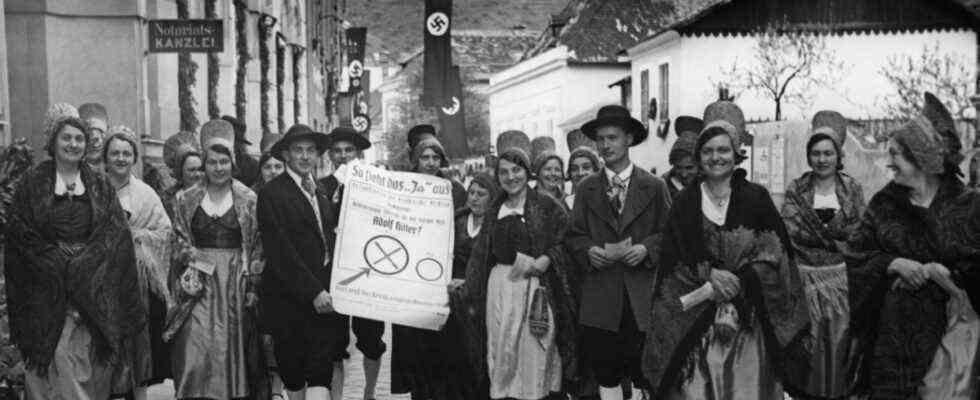On the evening of April 10, 1938, a lot will have happened in the Upper Austrian village below the Hochkogel. It is election Sunday. Large flags everywhere, mass in the mornings in the church, then celebratory meals, brass music and male choir, beer in the evening at the Platzer in the dining room. The village citizens will have unanimously approved the annexation of their country to Hitler’s Germany. Except for a vote against.
With the classic rule of the unity of place, time and action, Thomas Arzt, previously known as a playwright, drives the events through the undergrowth through the undergrowth of juicy description of the situation, direct speech in dialect sound, inner monologues and distant narrator murmur. A homeland novel? If so, then someone who does not spread cozy familiarity, but horribly echoes what is historically known and familiar.
“If Karl Bleimfeldner goes, he goes up the local road.” Like ancestral pictures on a nail on the wall of the room, the opening sentences of the 29 chapters, each attached to a character in a novel, are attached to the verb, which is often missing in the following sentences because the villagers understand each other anyway and therefore do not need to finish the sentences. Karl is the main character, a student, son of the local cobbler, who has returned home from Innsbruck for this Sunday. But “you’re never completely gone, even if you’re never there,” he thinks as he walks through the village.
The young people use sticks to hunt the “pig of mind”
In the afternoon he will then be walking around the top of the mountain less contemplatively and looking disturbed for a shelter from a pack of idiots and young Nazis following him on his trail. Before that, at the polling station, where the others proudly ticked their “yes” in public, when ticking the “no” behind the curtain, out of panic at the consequences of his courage, he was unable to behave, so that it ran over the floor of the parish hall. “The Trottl groaned at Hitler,” shouted one. So the young people are now after the “sentimental pig” with sticks and pistols.
In this book, Thomas Arzt shows how skillfully he can develop situations, scenes and moods in a novel. While most of the villagers act more like lukewarm followers who laboriously try to convince themselves of the welfare of the Greater German for their personal life, some profiles stick out sharp and angular. Kern Cilli, for example, daughter of the new mayor, who quickly recognized the signs of the times and ditched the old mayor – “Do long and put your knuckle under it”.
Even her own father seems to this Cilli, who raves about the political agitator Oskar from the seminary and has a Hitler photo under her blouse, unworthy of the new times with his roast pork cosiness. Because she herself dreams of unconditional will on the future battlefields. Whereas the shoemaker, Karl’s father, worries about where the many new boots should go.
Or there is also the monastery forester Lang. Although he is embarrassed to be only in the service of the Catholics, he wants all the more proudly to fell the most magnificent oak of his forest to celebrate the day as the “leader trunk” for particularly strong beams, before the seminary teacher Gotthard falls into his arms. This oak must stand still, he warns, who likes to come up under the German tree with his students to read Goethe. The forester should rather cut away the other trees around it.
As a tribute to the courage to refuse, the novel is convincing
With a sense for effective scene jumps, the author spans the events of the horribly serene day in an accelerated chapter rhythm. One is captivated by the multitude of anecdotes packed into the artificial local linguistic sound and visibly oppressed by all the trimmings. It is as if the atmosphere of Martin Sperr’s “Hunting Scenes from Lower Bavaria” flickered with it, instead of a clear reflection of the present in the brown past as in the case of Sperr, but now as a latent anticipation of our today. With half-sentences like “… Karl Friedl sister will say later”, the story from the present sometimes slips briefly into the future without specifying when, where and on what occasion the sister will say it. As if time had revolved around itself since that special day.
Thomas Doctor: The contrary voice. Novel. Residenz Verlag, Salzburg, 2021. 192 pages. 20 Euros.
So is that regional literature? A historical novel? A hint for our present with the fence post of history? A parable about following along, resignation, refusal, resistance? One hears the author telling the story of his great-uncle. As a tribute to the courage to refuse, the novel is convincing, the variety of profiles does not allow simplistic stereotypes to arise. Everyone has their reasons for taking part, and the only crosswalker is not a hero either, but waits at the train station the next morning for the train back to Innsbruck.
But the panorama reminds one of a coloring sheet with artfully drawn stencils, which you can color in your imagination while reading. Instead of an abyss, there is only a somewhat eerie background behind it, which also invites you to color. This book would be too picturesque for a historical novel and too clearly dated for a problematic novel spanning several epochs. What remains is the exciting portrait of an indomitable man who disappears again into the anonymity of his existence after this one day.

